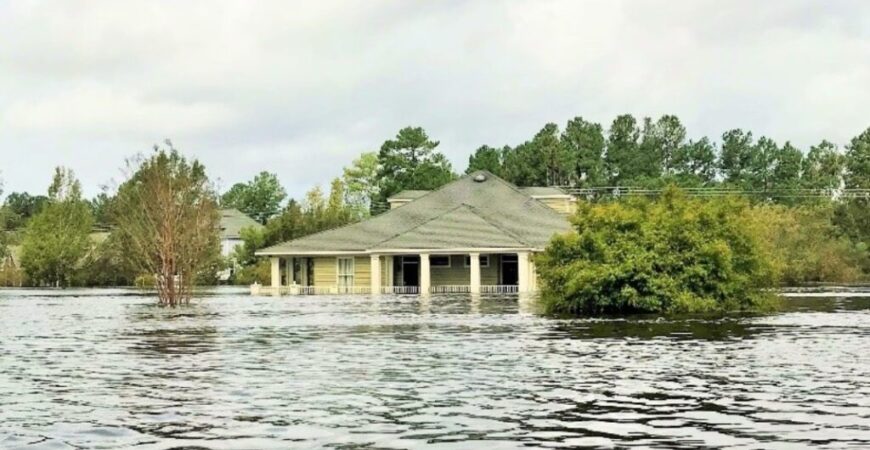A new rule from the North Carolina Real Estate Commission requires home sellers to disclose information about flooding damage to potential buyers. The rule went into effect on Monday, July 1.
The addition of flood-related questions to the Residential Property and Owners’ Association Disclosure Statement came about in December 2022, after the Southern Environmental Law Center filed a petition on behalf of the Natural Resources Defense Council, North Carolina Justice Center, MDC Inc., North Carolina Disaster Recovery and Resiliency School, Robeson County Church and Community Center, and NC Field.
“Without proper flood disclosure, a home buyer is left in the dark about the risk and potential lifetime cost associated with the home,” said Brooks Rainey Pearson, senior attorney with Southern Environmental Law Center.
The rule comes into play when sellers fill out the required disclosure statement, which asks questions about the home that’s potentially being sold, such as when the house was built, are there roof or pest problems, whether it’s in violation of any codes or ordinances, and so on.
Homeowners filling out the form can check yes, no or no representation, meaning basically that the homeowner can choose not to answer.
The new rule has brought somewhat mixed reactions from area real estate agents.
“I’m thrilled that this has happened,” said Realtor Curt Simpson of Simpson Real Estate in Wallace. “In real estate, the more you disclose, the better off everybody is.”
Realtor Courtenay Thompson of White House Real Estate said she’s pleased with the new rule as well, but she’s also wary of sellers potentially exploiting “gray areas” that have to do with what realtors call “material facts.”
“If a home is located in a flood zone, that’s a material fact,” she explained. “I have sold real estate in River Landing for most of my career, and I have always disclosed if there’s been flooding on a property. I always bring it up and it has definitely cost me some deals, but at the same time, sellers can always check no representation on the form if they choose not to answer. That’s a gray area with the new rule.”
With the new rule in place, the four-page form has become six pages, with new questions asking specifically about flooding and past flood damage.
Previously, the only question that the form asked about flooding was: “Is the property subject to a flood hazard or is the property located in a federally-designated flood hazard area?”
“‘Is it subject to a flood hazard’ is a very loose way of asking the question, and most people would say no,” Simpson said. “And if a seller or an agent didn’t want to be very forthcoming, they could answer that question no, and avoid a lot of questions about what happened in 2018 when we had Florence flood in lots of areas that were not federally-designated flood areas.”
The first question regarding flooding is the same, but then the next question delves deeper: “Has the property experienced damage due to flooding, water seepage or pooled water attributable to a natural event such as heavy rainfall, coastal storm surge, tidal inundation or river overflow?”
Other questions ask about insurance claims for flood damage, assistance from federal agencies for flood damage and if the property has been elevated due to flooding concerns.
“I’m not saying this is going to fix every problem, but it’s going to make it a whole lot more difficult for them to say, no, there’s no problem,” Simpson said.
However, as Thompson pointed out, “They can still check no representation. Some people just check no representation all the way down the form and it’s perfectly legal to do that.”
One might think the rule mostly affects the River Landing community, but Simpson said that’s not necessarily so. “It’s not just River Landing,” he said. “It’s pretty much everything from Chinquapin to Northeast. All of Highway 41, lots of property on Highway 50 flooded as well. There were houses in Beulaville that had flooded, houses in the Hallsville area that were flooded, and people came in and bought them after they had flooded out, renovated them, and with the rising real estate market, they have sold them, at a pretty good profit. If they’re not completely transparent about the flood risk, the buyers do not know what they’re getting.”
However, River Landing may bear the brunt of the new rule, in Thompson’s opinion. “It sucks for River Landing and Wallace in general because it scares people off when they find out a property has been flooded,” she said. “It is hard for sellers, too, because once you disclose that, it jades your property. But I do believe it should’ve been part of the form a long time ago.”
Homeowners and potential buyers can always visit http://fris.nc.gov and type in a specific address to find out if a home is prone to flooding.
 Twitter
Twitter Facebook
Facebook Instagram
Instagram





